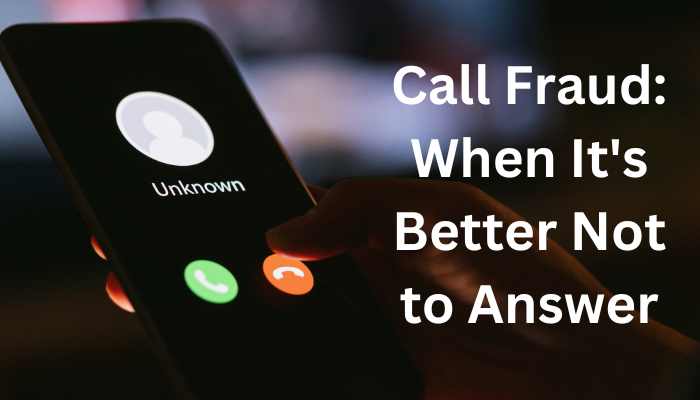
Call Fraud: When It’s Better Not to Answer
September 19, 2023 Comment off
In an era where our smartphones have become extensions of ourselves, receiving a call from an unknown number can stir a mix of curiosity and apprehension. While it might be a long-lost friend trying to reconnect, there’s also a chance it could be a fraudster on the other end of the line. Call fraud, also known as phone scams or vishing (voice phishing), is a growing concern worldwide. Let’s delve into the world of call fraud and understand when it’s better not to answer.
1. The Rise of Call Fraud
Over the past decade, advancements in technology have made it easier for scammers to target individuals via phone calls. With the availability of cheap VoIP services, fraudsters can make calls from anywhere in the world, disguising their true location. Caller ID spoofing tools further allow them to mask their identity, making it appear as if they’re calling from a legitimate or local number.
2. Common Types of Call Fraud
- The Tech Support Scam: The caller claims to be from a well-known tech company, informing you about a virus on your computer. They’ll offer to fix it for a fee or gain remote access to your device.
- The IRS or Tax Scam: Posing as tax officials, scammers claim you owe money and threaten legal action unless you pay immediately.
- The Lottery or Prize Scam: You’re informed that you’ve won a large sum of money or a prize, but you need to pay a fee or provide personal details to claim it.
- The Kidnapping Scam: The scammer claims to have kidnapped a loved one and demands a ransom for their release.
3. Red Flags to Watch Out For
- Urgency: Scammers often create a sense of urgency, pressuring you to make quick decisions without thinking.
- Request for Personal Information: Be wary of unsolicited calls asking for personal or financial details.
- Threats and Intimidation: Legitimate organizations will never threaten you over the phone.
- Unusual Payment Methods: Scammers might ask for payment via gift cards, wire transfers, or cryptocurrencies.
4. How to Protect Yourself
- Don’t Trust Caller ID: Remember that caller IDs can be spoofed.
- Hang Up: If a call seems suspicious, it’s okay to hang up. You can always call back on a verified number.
- Verify: If someone claims to be from a specific organization, hang up and call the official number to verify.
- Never Share Personal Information: Unless you initiated the call and trust the other party, never share personal or financial details.
- Report Suspicious Calls: Many countries have hotlines or online portals where you can report fraudulent calls.
5. The Power of Awareness
Awareness is our most potent weapon against call fraud. By staying informed about the latest scams and educating our friends and family, we can create a community that’s hard to deceive. Remember, in the world of call fraud, sometimes silence is golden. When in doubt, it’s always better not to answer.